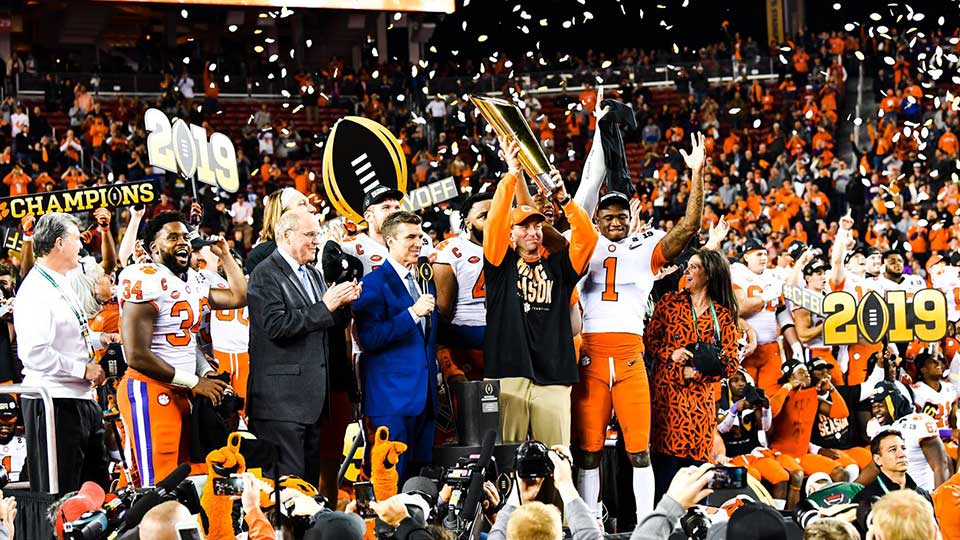
Mark Scott, Communications Director for Kansas Family Voice
DABO!
If you’re a college football fan, you know Dabo Swinney. This week he led his Clemson Tigers to their second national championship in the past three years. And as an outspoken Christian he gave Jesus Christ the credit for his success on television after the game in front of millions of viewers.
But being a Christian in today’s world – especially those in the public eye — isn’t always easy. And Dabo’s story goes much deeper into what challenges he’s faced all in the name of his faith. David French with The National Review goes deeper into how Dabo has effectively fought off challenges to his faith.
Liberal media and outspoken atheist groups jumped on Dabo not long after he became Clemson’s head coach and have continued to harass him for his faith, threatening boycotts and lawsuits and, well, about everything you can threaten. One group went as far as to call his approval of a team chaplain’s voluntarily-participation devotionals for players “abusive.”
Dabo especially caught the attention of angry atheists in 2012 when one of his star players, Deandre Hopkins, accepted Jesus Christ as his personal savior while attending NewSpring Church in Anderson, South Carolina, which is pastored by Perry Noble. What happened next was reported in the Washington Post:
Hopkins, approached Noble with a specific request: He was ready to be saved and wanted the pastor to baptize him — not in the church, though, but alongside his teammates. With Swinney’s blessing, an ice tub was hauled onto a Clemson practice field, land paid for by state taxpayers and filled with water.
The coach spoke briefly about the Tigers’ upcoming game against Auburn, and then he turned things over to Noble. With players and coaching surrounding them, Noble said a few words before guiding Hopkins under, water washing over the young player still in his pads.
Jeff Scott, the team’s wide receivers coach, photographed the occasion and posted it on Twitter, calling it the “highlight of my week.” Scott’s post was shared hundreds of times, eliciting praise from fans across the South — no matter their thoughts on the team Hopkins played for.
“Football may be a religion, but faith is everything,” says Jeff Champion, who as a South Carolina fan usually dislikes anything involving Clemson. “Dabo is actually giving them something they can carry with them the rest of their lives. I’m just jealous that it’s them and not us.”
The threats and scare tactics have continued. But Dabo responded to critics best when, in 2014, he said this: “Spirituality is a personal decision for everybody. It’s a free country here, and I can live my life the way I want to. I can’t come to work and not be a Christian.”
Perhaps you feel the same way: I can’t go to work and NOT be a Christian. But too often Christians are feeling the impact of their faith in the workplace. Can you really stand up and proclaim your faith? Here’s a few things that we can learn from Dabo:
- He chooses to work at a place that supports his personal values. When threatened with a lawsuit, Clemson University supported its coach and said this: “The Supreme Court has expressly upheld the right of public bodies to employ chaplains and has noted that the use of prayer is not in conflict with the principles of disestablishment and religious freedom.” You can expect that if Clemson didn’t support Dabo’s religious freedom, he’d find another place to work.
- He doesn’t sacrifice his beliefs even in the wake of criticism. Knowing that liberal groups are actively seeking a player or former player to sue him and the university, Dabo could easily sacrifice his beliefs and “play it safe” by checking his faith at the door. It is clear, however, through years of threats that his faith remains strong.
- His players support him. Dabo recruits young men and surrounds himself with people who trust and love one another. Dabo has three rules: Players must go to class, give a good effort, and must be good citizens. He has recruited coaches and players of many different faiths and players with no faith at all. Everyone is welcome in his program and not one player has ever complained that Dabo’s faith has been harmful, like atheist groups allege.
Religious freedom and football go much further than the best college football team in the country. We’re seeing high school coaches face similar threats because of their personal faith, which only makes us redouble our efforts to protect the religious freedoms of our coaches and educators. Hopefully it motivates you, too.
Last year we worked with legislators in Georgia to introduce a bill to reinforce the religious liberty protections of students and faculty, including teachers and coaches. This bill protected students’ rights to voluntarily express their faith and to pray on school grounds. It further made clear that teachers and coaches do not have to not flee the room when students engage in their constitutionally-protected right to express their religious beliefs.
As we celebrate Dabo and the Clemson Tigers, let us not forget about Coach Joe Kennedy and others who have lost their jobs because of their faith. Let this encourage us to redouble our efforts to protect religious freedom in our country.